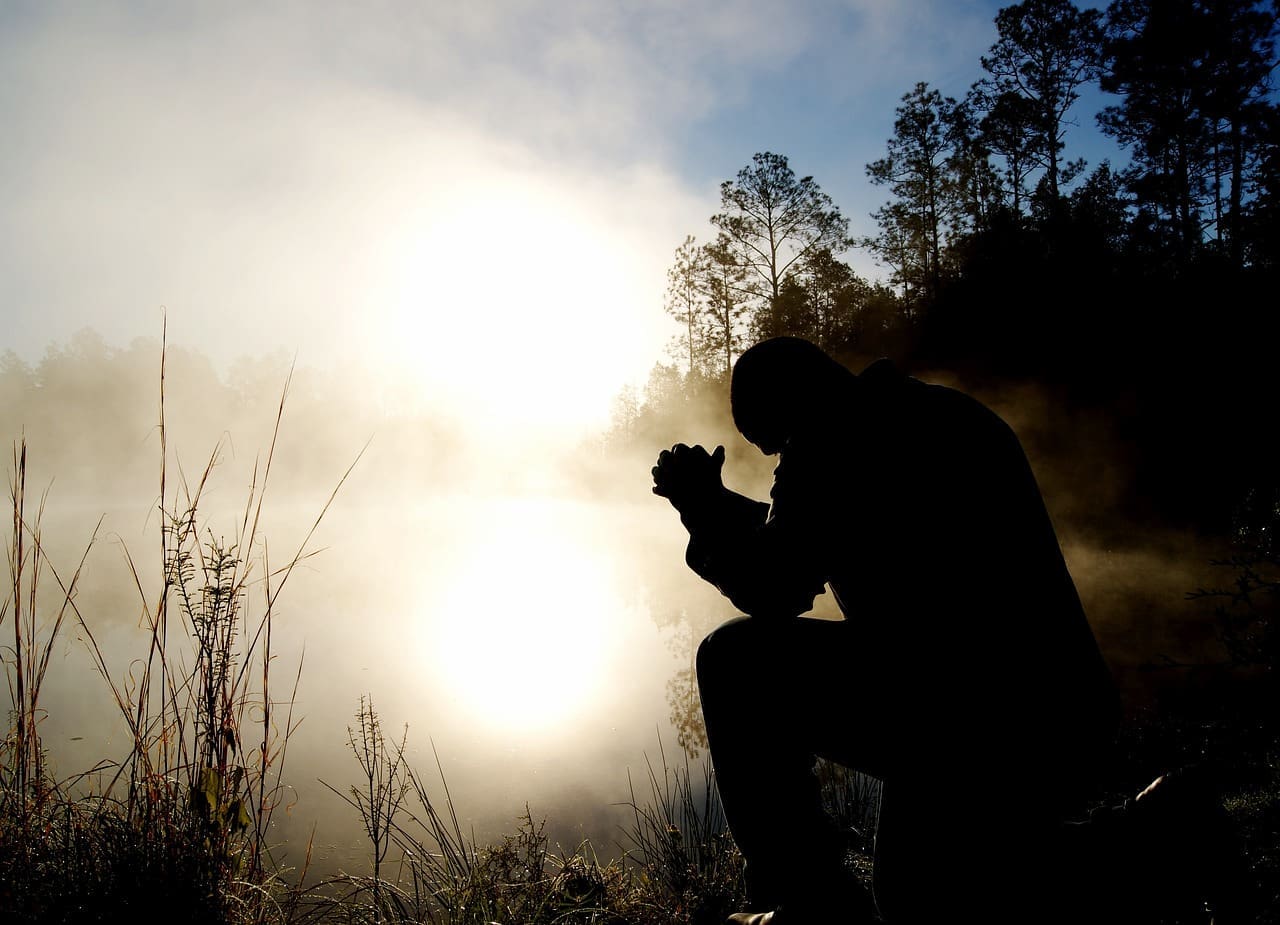For some years now I’ve practiced intermittent fasting for health and vitality, however, I never really thought about spiritual fasting before. I am a professional meditation teacher and someone deeply interested in spiritual growth, so in hindsight, I find it odd that the concept never crossed my mind.
Of course, I’ve heard of fasting being practiced in various religions like Islam and Judaism, but I didn’t grow up in a religion that every talked about fasting or abstinence as a form of worship. So, I guess I never considered that the purpose or benefits of spiritual fasting could also apply to me.
I started to wonder, what exactly is spiritual fasting? And how can it enhance my spiritual journey or personal growth? What I found out is that, ultimately, spiritual fasting is a purposeful sacrifice in search of a deeper connection with the Divine, and it looks different for everyone.
In this article I discuss what I learned about this age-old practice, it’s role in various faiths, and how it can enrich your spiritual well-being. I’ll also give some tips for fasting safely.
Key Takeaways
Spiritual fasting is an ancient discipline that focuses on abstaining from food to enhance one’s spiritual connection and seek divine guidance.
There are different types of spiritual fasts including complete fasts, partial fasts, and non-food fasts, each uniquely tailored to foster self-awareness.
Practicing this type of fasting safely involves preparation, maintaining hydration, and mindful re-introduction of food, and can result in improved self-control, heightened spiritual awareness, and overall well-being.
Understanding Spiritual Fasting

The concept of spiritual fasting, abstaining from food for spiritual purposes, finds its roots in religious practices. Throughout history, fasting has been a significant practice in various faith traditions, including:
Christianity
Islam
Judaism
Hinduism
Buddhism
Fasting is seen as a humble act of worship that brings us closer to our Divine (which you may call God, Source, Nature, the Universe, or whatever you like).
In biblical times, fasting was a form of worship and prayer, often undertaken during periods of mourning, national repentance, or when seeking divine guidance. During Jesus’ time, Jews frequently practiced fasting as a vital part of their religious observance.
Notable biblical figures fasted to overcome temptation and prepare for important spiritual tasks. Christian fasting is a discipline that mirrors Jesus’ call for daily cross-carrying and self-denial in the form of food restriction (in a way that does not harm the body).
The Purpose of Spiritual Fasting

Fasting transcends mere self-denial; it involves a conscious decision to forego food in an effort to deepen our relationship with our Divine. Many people wonder, as I did, how fasting can impact their spiritual journey and bring them closer to their faith.
Fasting for Divine Direction
One aspect of spiritual fasting is that it provides a dedicated period for the seeker to focus on receiving guidance. The act of fasting involves removing distractions to create space for higher spiritual focus. We all know it is sometimes difficult to connect with or hear our Source above the noise of today’s world, but fasting helps direct our attention to that with which we want to commune.
Throughout history spiritual seekers observed fasts to seek wisdom, protection, and direction. Whatever the goal of our fasting, which could also be worship, repentance, seeking forgiveness, etc., the act of fasting helps keep it at the forefront of our minds, fostering the attention needed to recognize divine guidance.
Fasting to Cultivate Spiritual & Personal Growth
As a spiritual discipline involving personal sacrifice, fasting contributes not only to the growth of faith but also to personal growth and self-awareness.
Voluntary abstinence from certain needs or desires cultivates our self-awareness and discipline and enhances our self-control. It also contributes to personal growth through humility.
The practice of self-denial through fasting can lead to a realization of what truly nourishes the soul, such as the ‘living bread’ and the ‘life-giving water,’ as opposed to the material or worldly sustenance that we have been taught to seek.
In many traditions, fasting and prayer go hand in hand, intensifying spiritual connections and facilitating improved communication with the Divine. Prayer (which comes in many forms), when combined with fasting, is said to have several benefits:
Sharpens an individual’s focus
Provides clarity in their decisions
Strengthens their spiritual connection
Guides them towards divine direction
Real-World Perspectives on Spiritual Fasting
While exploring the profound spiritual dimensions of fasting, I wanted to get some insights from people who have actually practiced fasting for religious and personal reasons. Here are four enriching perspectives from top executives, including CEOs and managing directors, to help us understand its impact on personal growth and how fasting can enhance our spiritual journey.
Enhances Spiritual Clarity
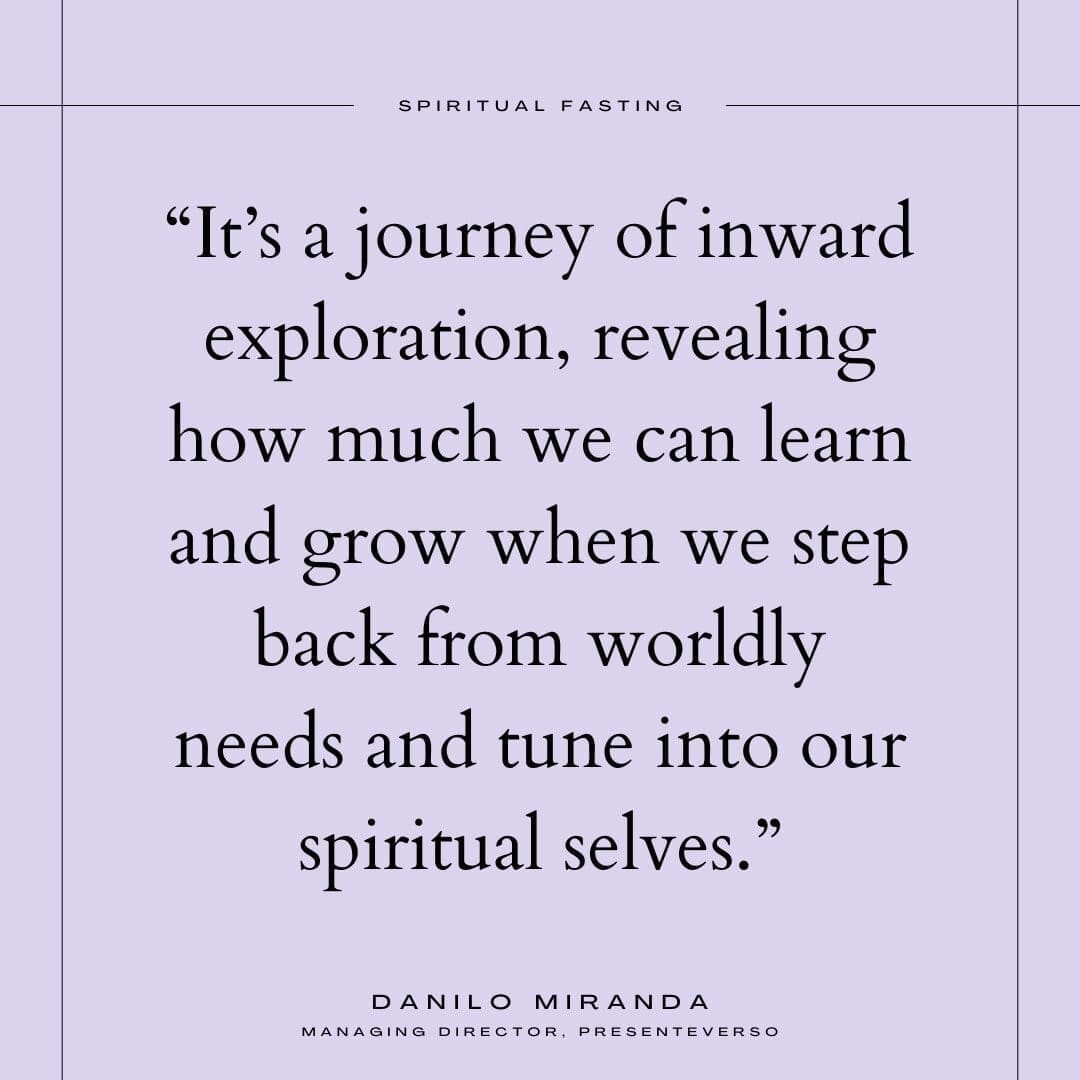
“Fasting, for me, has been a profound spiritual practice that opens up channels of deeper clarity and connection. It acts as a humbling process, reducing dependence on the physical world and enhancing spiritual receptivity. During fasting, I find that the voice of God, or the inner sense of spiritual guidance becomes much clearer, aiding in decision-making and providing a sense of direction.
Reading Scripture while fasting intensifies the experience; the words resonate with amplified power and urgency, uncovering deeper meanings and wisdom. It feels as though a veil is lifted, allowing me to connect more profoundly with spiritual truths.
Furthermore, fasting shifts my focus from the material to the spiritual, altering my perception and deepening my understanding of life’s greater purpose. It restrains the dominance of physical desires and opens a space for spiritual insights. Remarkably, most of my spiritual visions and direct communications have occurred during or as a result of fasting.
Though fasting constitutes a small fraction of my life, its impact on my spiritual sensitivity and submission is disproportionate. It’s a journey of inward exploration, revealing how much we can learn and grow when we step back from worldly needs and tune into our spiritual selves.”
Danilo Miranda, Managing Director, Presenteverso
Allows for Deeper Connections
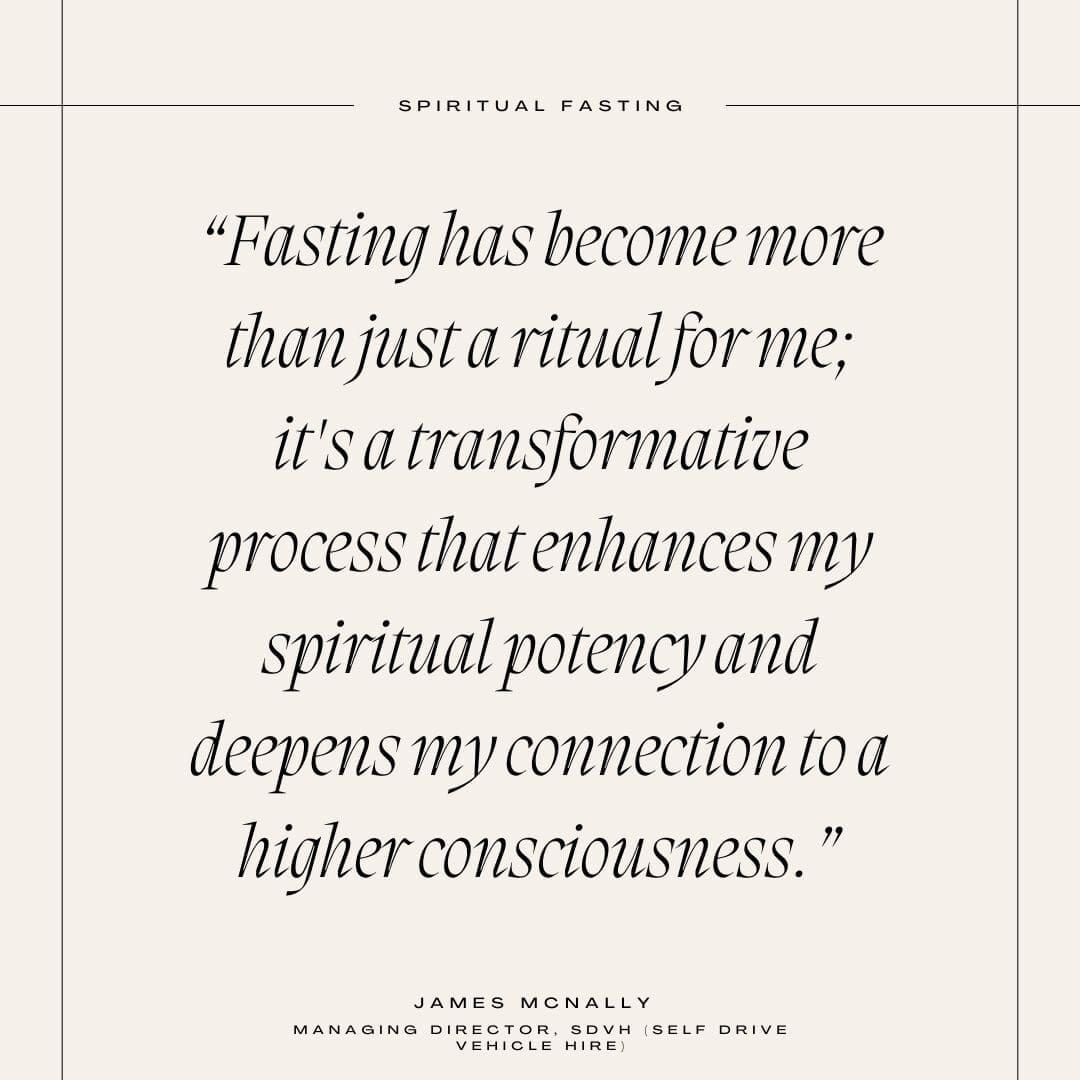
“Fasting, in my experience, has been a gateway to unlocking spiritual power. It’s a practice that teaches me to let go of reliance on lesser, worldly sources of energy, allowing a deeper connection with a higher power.
During my fasts, I notice a distinct increase in my sense of authority and power, not just in my speech but in all my actions. This heightened spiritual power is most evident in the way I interact with the world around me while fasting. There’s a certain clarity and purpose in my actions that seems directly tied to my fasting state.
Fasting has become more than just a ritual for me; it’s a transformative process that enhances my spiritual potency and deepens my connection to a higher consciousness. It’s as if fasting peels back layers, revealing a purer, more powerful spiritual self.”
James McNally, Managing Director, SDVH [Self Drive Vehicle Hire]
Fosters Mindfulness
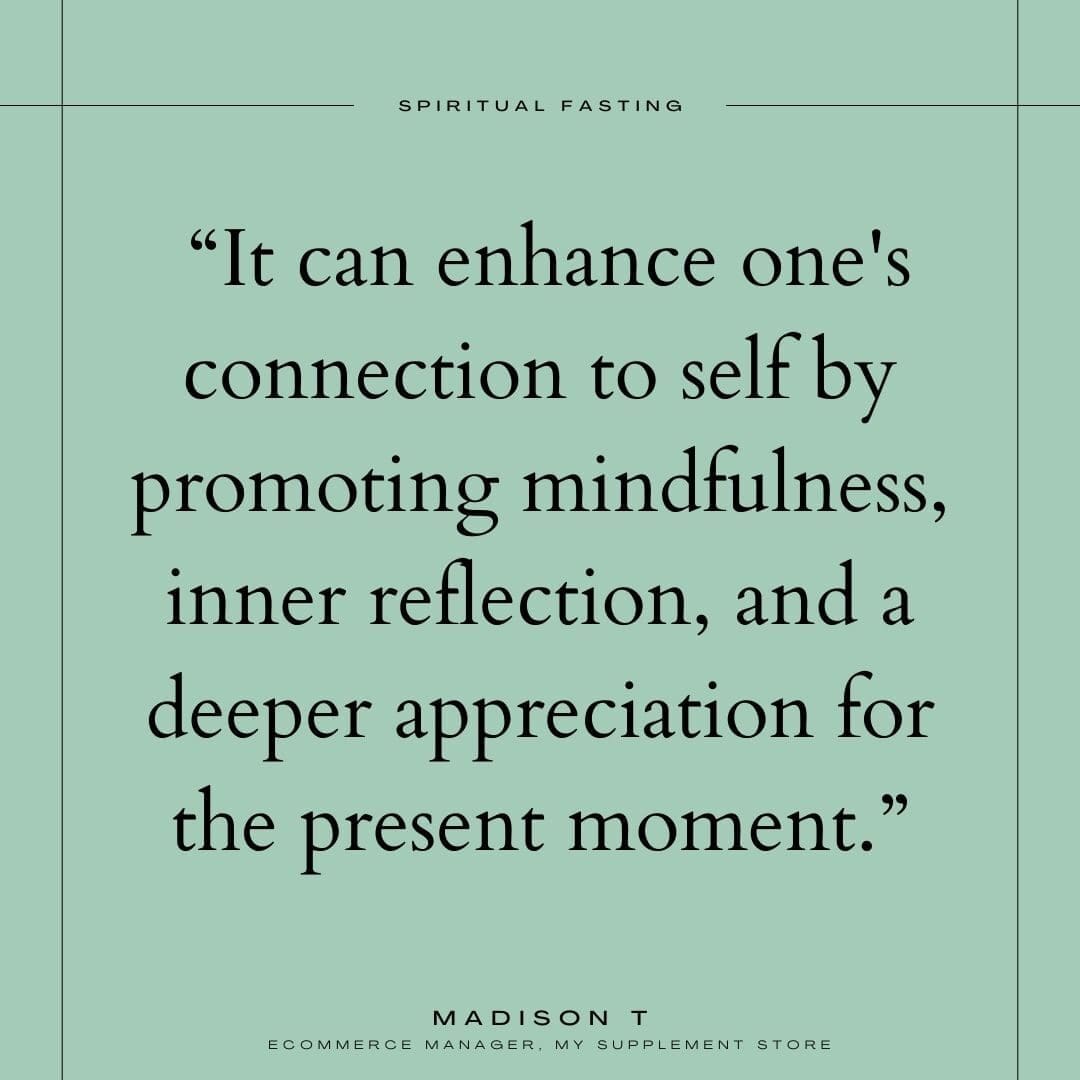
Fasting is often viewed as a practice that fosters self-discipline and introspection, creating an opportunity for spiritual growth. It can enhance one’s connection to self by promoting mindfulness, inner reflection, and a deeper appreciation for the present moment.
Through abstaining from physical nourishment, individuals may also seek to align themselves with higher spiritual principles or connect with a sense of transcendence.”
Madison T, Ecommerce Manager, My Supplement Store
Disciplines the Mind and Body
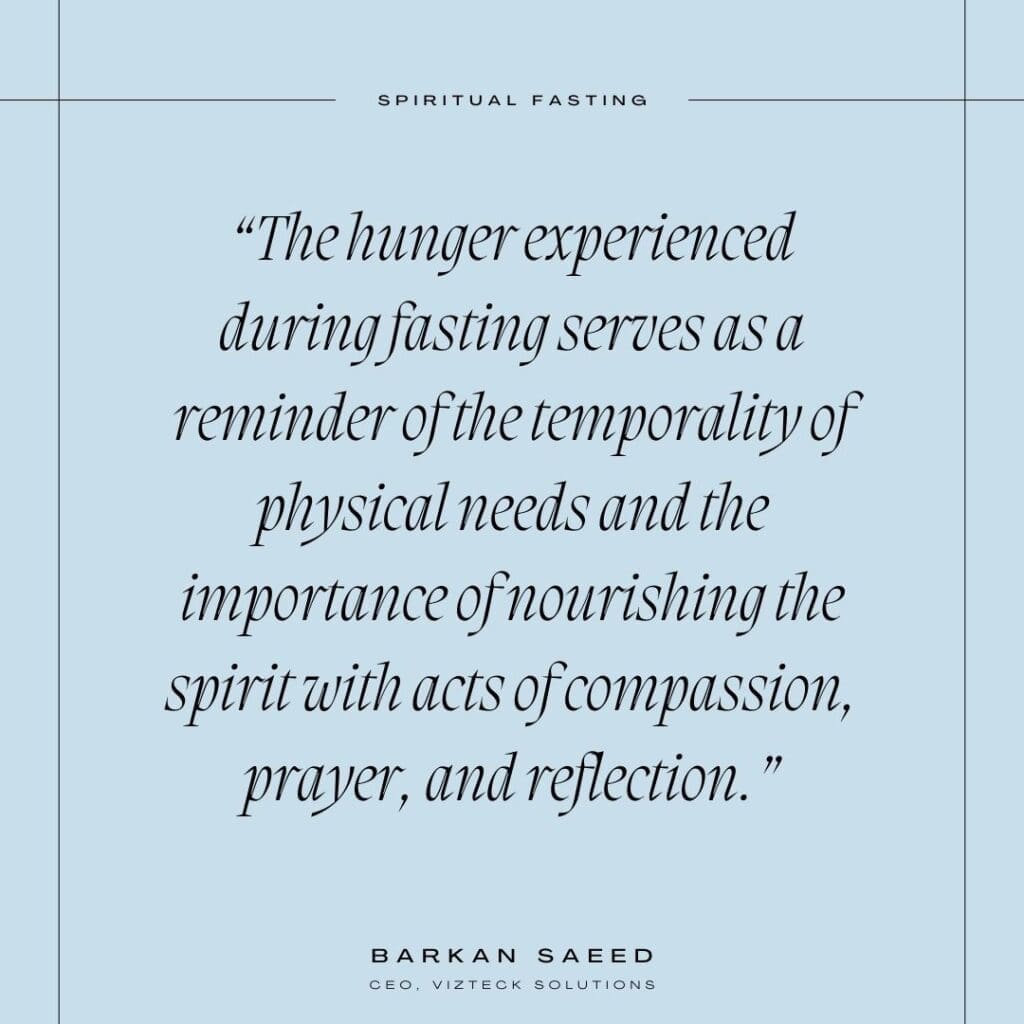
“Fasting disciplines the mind and body, directing us away from distractions and toward inner clarity. Mastering the desire for food impulses helps us control our other impulses and desires.
We sharpen our ability to govern our thoughts instead of being governed by them. I have personally experienced, though, that fasting as just a ritual doesn’t help much. The hunger experienced during fasting serves as a reminder of the temporality of physical needs and the importance of nourishing the spirit with acts of compassion, prayer, and reflection.
Fasting is a strong practice if guided by principles of humility, patience, and gratitude.
Barkan Saeed, CEO, Vizteck Solutions
Different Types of Spiritual Fasting

Spiritual fasting can take various forms, such as complete fasts, partial fasts, and non-food fasts, each offering its unique spiritual benefits and challenges.
Complete Fasts
A complete fast typically involves abstaining from all food, allowing only liquids such as water, or sometimes juice. This form of fasting can sometimes span up to 24 hours, beginning from one sunrise and ending at the next.
Muslims will fast from sunup to sundown during Ramadan, and have special traditions regarding how their fast is broken in the evening.
Partial Fasts
Partial fasts involve restricting certain types of foods or meals rather than abstaining from all food. Examples of partial fasts include consuming only water during the fast or following a ‘Daniel fast’, which excludes meats and pleasant or rich foods.
Non-Food Fasts
Non-food fasts constitute a form of spiritual fasting that extends beyond abstaining from food. Instead, it involves avoiding activities that distract from spiritual growth.
Common types of non-food fasts may involve things like:
Refraining from watching television
Abstaining from sex
Not using social media
Engaging in non-food fasts helps in identifying personal cravings and dependencies, thereby understanding the control they exert in our lives.
The Spiritual Benefits of Fasting on Mind, Body, and Soul

Fasting can enhance holistic health, affecting the body, mind, and spirit as a whole and deepening the mind-body connection. It can lead to health benefits such as an improved mood, increased energy, and overall well-being.
Enhanced Self-Control & Awareness
One widely reported benefit of spiritual fasting is that it increases the ability for self-control. Practitioners of spiritual fasts claim they feel a stronger ability to resist physical temptations and desires, as well as a greater reliance on spiritual support, which lessens the need for immediate gratification.
Believers also report experiencing a heightened sense of Divine presence during fasting, leading to spiritual, physical, and mental refreshment.
Following a spiritual fast, individuals often feel a surge in motivation and an increased sense of well-being, feeling more connected to Holy Spirit and having more energy and awareness. This newfound spiritual clarity can be transformative for many people.
Improvement in Physical Well-Being
Fasting is often associated with weight loss. However, this should not be your only motivation. It can also help reduce stress, aid in cellular repair, and allow time for the body to recover from other health issues.
An 8-day water-only fast helped participants lose weight, reduced their physical body weight, lowered blood glucose levels, and increased stress response without adversely affecting mental well-being. Fasting has also been shown to increase the body’s cancer-fighting abilities and aid in deep and restful sleep.
So, fasting clearly offers many physical and spiritual benefits. Consider all of them carefully and make sure you’re intentions for fasting are pure and directed toward your whole mind-body-spirit health, not just weight loss.
How to Practice Spiritual Fasting Safely and Effectively

Embarking on a spiritual fast requires maintaining hydration, eating suitable foods, and gradually reintroducing solid food post-fasting. This approach ensures a safe and effective fasting experience.
If you’d like to try spiritual fasting for yourself, here are a few things to keep in mind:
Preparing for the Fast
Preparing for a spiritual fast begins with mental preparation, like relaxing, breathing deeply, and consciously placing oneself in the presence of your Divine as a way to offer time and worship faithfully, which can help one grow spiritually through dedicated spiritual practice.
For beginners, it can be as simple as giving up one meal for a day or choosing to abstain from one specific type of food or drink throughout the fasting period.
Maintaining Balance During the Fast
Keeping hydrated is essential during a fast; water should be included even when one abstains from food. Individuals with underlying health conditions such as:
pregnancy
anemia
behavioral disorders
chronic health problems
should consult a physician before fasting due to potential health risks.
End Your Fast Mindfully
When your fast has ended, take a moment to offer gratitude for what you experienced and learned during the fast. A brief mindful moment can deepen your awareness of areas in which you want to continue growing, learning, and expanding.
After a spiritual fast, especially longer ones, it’s beneficial to reintroduce solid foods gradually, allowing the body to adjust. Here is a suggested plan for reintroducing foods:
Start with small amounts of easily digestible foods like yogurt, soup, fresh fruit, and cooked vegetables.
Gradually introduce more substantial foods, such as lean proteins and whole grains.
Stop eating at the slightest sensation of fullness to avoid overeating.
By following this plan, you can ensure a smooth transition back to regular eating after a fast.
Embracing Spiritual Fasting as a Path to Enlightenment and Healing
My exploration into the world of spiritual fasting has taught me the value of approaching this practice with intention and a readiness to learn from the experience. It’s not merely an act of faith or discipline but a deeply personal exploration that beckons us towards self-discovery, healing, and an ever-deepening pursuit of connection with something greater than ourselves. It can be a powerful tool in our spiritual arsenal.
In sharing this exploration, I hope to encourage others to view spiritual fasting not just as a ritual but as a vibrant avenue for growth, reflection, and profound connection. Through abstaining from food and sometimes activities that divert our focus from spiritual growth, we open ourselves to profound insights, heightened spiritual clarity, and a strengthened resolve to navigate life’s challenges with wisdom, resilience, and grace.
Spiritual fasting is a testament to the power of personal sacrifice in pursuit of something infinitely greater—our deepest spiritual essence and the boundless potential it holds for enlightenment and transformation.
Have you ever tried a spiritual fast, or is it something you do regularly?
What benefits do you experience from spiritual fasting?
Let me know in the comment section. I would love to hear your insights!

